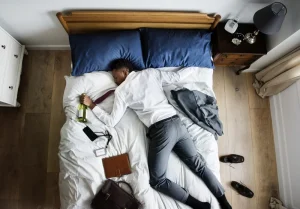
Eating smaller meals and avoiding heavy drinking may help manage these symptoms. More research is needed about the exact associations between diet and migraines. However, the current consensus is that they increase the chances of attacks. And, for an estimated 20% of those with this disorder, certain foods and drinks act as triggers. If either or both of these things are migraine triggers for you, gin could trigger a migraine attack. About 1/3 of people with migraine say dehydration is a trigger, and for some, even the slightest hint of dehydration can be the fast track to debilitating head pain.
Alcohol and Migraine: What Should We Tell Patients?
The number of drinks you have, what you are drinking, and what’s going on in your life may be the primary culprits, rather than alcohol itself. Research still needs to determine which remedy is most effective. However, a headache after drinking will usually resolve itself does alcohol cause migraines over time. Avoiding drinking is the best way to prevent an alcohol-related headache. Males should aim to drink two or fewer drinks daily, and females should aim to drink one or fewer. Migraine typically begins slowly and may increase in severity if left untreated.
Alcohol and migraine: trigger factor, consumption, mechanisms. A review
If you’d like to learn more about migraine, watch or other related videos or visit mayoclinic.org. The most common symptom of migraine is the intense throbbing head pain. This pain can be so severe that it interferes with your day-to-day activities. It can also be accompanied by nausea and vomiting, as well as sensitivity to light and sound. However, a migraine can look very different from one person to another. Some people may get prodrome symptoms, the beginning of a migraine attack.
What alcohol to drink to avoid migraine attacks
Most studies point to red wine as a common headache culprit, particularly in people with migraine. These individuals commonly cite wine, especially red wine, as a migraine trigger. A 2016 review notes that alcohol may trigger a tension headache, especially if a person also has migraine. The research found that 21% of people with migraine say that alcohol is a tension headache trigger, compared with just 2% of people without migraine.
- In fact, around 30 percent of people who experience recurrent migraines report alcohol as a trigger.
- About a third of people with migraine find that alcohol can trigger their attacks, while about 10 percent find it triggers them on a regular basis, according to a 2016 study.
- However, a headache after drinking will usually resolve itself over time.
- And more than 77 percent cited red wine specifically as a migraine trigger.
- A detailed description of risk of bias assessment for the cohort studies is presented in Table Table3.3.
Quantity is definitely a factor in whether drinking alcohol will trigger a headache, and the quality of alcohol probably plays a role as well. We do not know for sure, though, how any specific type of alcoholic beverage will affect people with migraine. If you’ve identified alcohol as a trigger for your migraine headaches, avoiding it altogether is probably best. The same is true if you find that some types of alcohol trigger your migraine headaches more than others.
Find a Doctor
Keeping a headache diary will help you determine whether alcohol is definitely triggering your attacks. Keeping note of things like stress, what you’ve eaten, your caffeine consumption, your menstrual cycle, and your sleep pattern over a few months will help you identify your migraine triggers. You should also record how much alcohol you drink, what types of drink you’ve consumed, and how much. You can take your diary to your doctor and they’ll help you work out what might be triggering your attacks.

- Some have infrequent attacks, but others may have frequent disabling attacks.
- This could potentially explain why some people with migraine find they can’t drink certain darker drinks like beer or red wine, however, more research is needed to find out.
- Certain substances found in some alcoholic drinks, especially histamine, tyramine, and sulfites, have been linked to attacks.
- There are also the side effects of drinking that might be to blame.
- Drinking while you feel like this may make you feel worse and prolong your attack, so it’s best not to drink until you feel completely back to normal.
Next, talk to your healthcare professional about your symptoms. Eradicate the words “I’m fine” from your vocabulary and be honest with your healthcare professional, your employer, your loved ones, about how you’re feeling as well as the kind of support that you need. Make yourself a top priority when you’re having a migraine attack and reduce the likelihood of attacks through lifestyle adjustments. Have a consistent schedule, get adequate sleep, and learn strategies to cope with the stresses of life using mindfulness and meditation. Empower yourself to manage migraine with lifestyle changes and migraine specific treatment options. Together you and your doctor can manage the disease of migraine.


Analysis of alcohol consumption
- The American Migraine Foundation is committed to improving the lives of those living with this debilitating disease.
- It’s interesting to note that cocktail headaches are much rarer than hangover headaches, and they can be triggered by variable amounts of alcohol.
- The ways describing alcohol consumption habits were variously presented in almost each study, therefore could develop the observed heterogeneity among migraine analysis.
- Often, alcohol-induced headaches also have characteristics that resemble your usual headaches, whether they are migraines, cluster headaches, or tension headaches.
- Certainly, some headache patients cannot tolerate some alcoholic drinks, although not frequently, and perhaps only in combination in the presence of other trigger factors (stress, for example).
